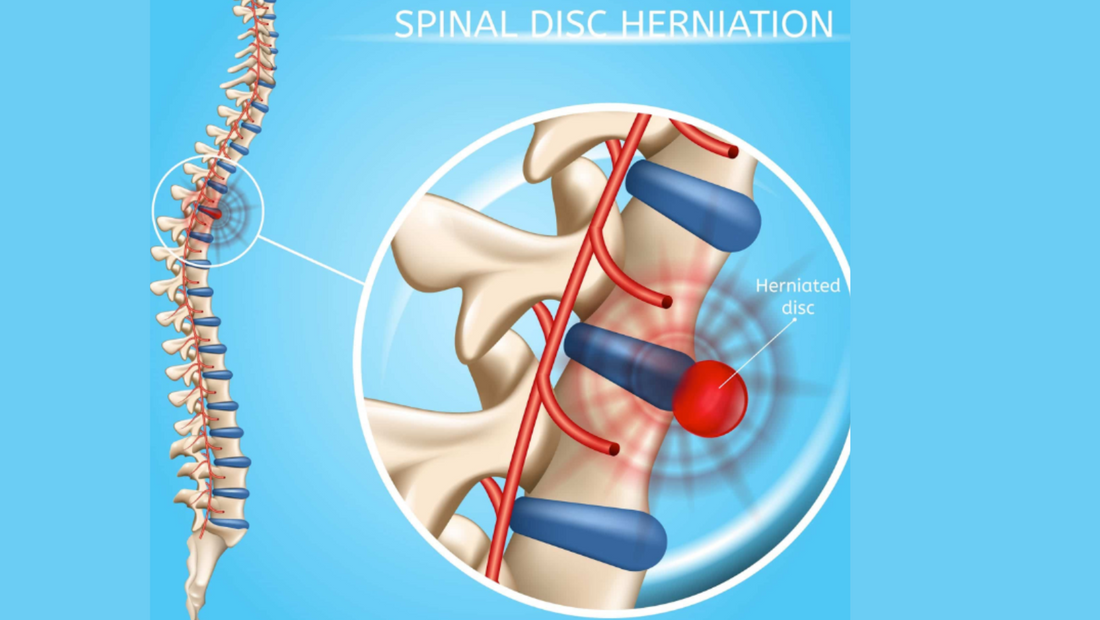
Herniated Disc: Causes, Symptoms, Treatment Options and Supplements
Share
It is estimated that around 80% of individuals will encounter low back pain at some stage in their lives, with lumbar disc herniations being a prevalent reason for pain in the back and legs*
A herniated disc, also known as a slipped or ruptured disc, can be a painful and debilitating condition that affects the spinal column. In this article, we'll discuss the causes, symptoms, risk factors, treatment options, and supplements that may help manage symptoms associated with herniated discs.

A herniated disc, also known as a slipped disc or a ruptured disc, is a condition that affects the spine. It occurs when the soft, gel-like center of a spinal disc protrudes through a tear in the outer layer of the disc. This can put pressure on nearby nerves or the spinal cord, causing pain, weakness, and numbness in the back and/or limbs.
Herniated discs most commonly occur in the lower back (lumbar spine) or the neck (cervical spine), but they can also occur in the upper back (thoracic spine). Some common causes of herniated discs include age-related wear and tear, repetitive stress on the spine, or an injury to the spine.
Causes of Herniated Discs
A herniated disc occurs when the soft, jelly-like center of a spinal disc protrudes through a tear in the disc's tough outer layer. This can happen due to a variety of reasons, including:
- Aging: As we age, the spinal discs lose their water content and become less flexible, making them more prone to herniation.
- Injury: A sudden injury or trauma to the spine, such as a fall or a car accident, can cause a herniated disc.
- Repetitive motion: Repeatedly bending, lifting, or twisting can put stress on the spine and increase the risk of a herniated disc.
- Genetics: Some people may have a genetic predisposition to developing herniated discs.
Symptoms of Herniated Discs
The symptoms of a herniated disc can vary depending on the location of the herniation and the severity of the condition. Common symptoms include:
- Pain: The most common symptom of a herniated disc is pain, which may be sharp, burning, or tingling. The pain may be felt in the back, neck, arms, or legs, depending on where the herniation is located.
- Numbness or tingling: Herniated discs can cause numbness or tingling in the affected area. For example, a herniated disc in the neck may cause numbness or tingling in the arms, while a herniated disc in the lower back may cause numbness or tingling in the legs.
- Weakness: Herniated discs can cause weakness in the muscles of the affected area, making it difficult to perform certain tasks or movements.
Risk Factors for Herniated Discs
While anyone can develop a herniated disc, there are certain factors that can increase the risk of developing this condition, including:
- Age: As we age, the risk of developing a herniated disc increases.
- Genetics: Some people may have a genetic predisposition to developing herniated discs.
- Occupation: Jobs that require repetitive lifting, bending, or twisting can increase the risk of a herniated disc.
- Obesity: Excess weight can put added stress on the spine and increase the risk of a herniated disc.
Treatment Options for Herniated Discs
The treatment options for herniated disc will depend on the severity of the condition and the individual's symptoms. In many cases, conservative measures such as physical therapy, pain medication, supplements and rest can be effective.
Start with supplements like Nutrisage Back Health & The Joints Co Ultra Ease and do a course of 2-3 months and come back for review.


For most of Herniated Disc cases,The Joints Co Ultra Ease will work on correction of disc and Nutrisage Back Health will work on inflammation and pain associated with bulging disc treatment and If conservative measures are not providing relief, other options may be recommended, including:
Try supplements in herniated disc condition before going for more radical and invsive methods like surgeries.Products like The Joints Co Ultra Ease and Nutrisage Back Health are 100% Natural and do not carry any side effects even when used for longer period of time.Along with supplements do rest and take physical therapies if possible.
Fish Oils are also proven to show beneficial effects in this condition.
Conclusion
Herniated discs can be a painful and debilitating condition, but there are several treatment options available to help manage symptoms and promote healing. By understanding the symptoms, causes, and risk factors of herniated discs, individuals can take steps to prevent injury and seek appropriate treatment when necessary. Additionally, supplements may be a beneficial addition to a treatment plan for those with herniated discs, but it is important to speak with your healthcare provider before starting on any of treatment options.

